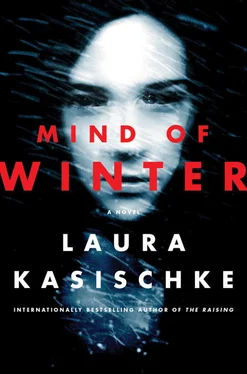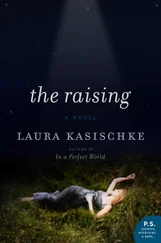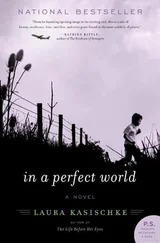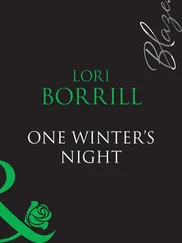German Barbie, Second Edition, with her absurd blond braids and fixed expression of surprised delight. It was the Barbie Tatty had insisted on when Holly had excitedly pointed out Imperial Russian Princess Barbie to her on the Internet. Although Holly had ended up buying them both, the Imperial Princess never budged from the shoe box in which Tatty kept her at the bottom of the toy box, while the German Barbie slept with Tatty every night.
“Tatty?”
Ridiculously, Holly had spoken her daughter’s name to the awful doll. Of course, the doll said nothing, and a wave of horror passed through Holly’s body then, a kind of nausea, beginning in her stomach but sliding up her spine and into her brain. Panic.
Had she honestly thought, or only felt, primevally, in her Irish bones:
Changeling?
Holly yanked the covers off German Barbie then to find no three-year-old Tatty under there with her.
“ Tatty?! ” By now, Holly was angry. She thought, she’s punishing me. Which was also ridiculous! A toddler doesn’t punish her mother.
The rest was a blur of very precise imagery, as if Holly’s horror had been turned into a mental slideshow—fifty very clear slides of herself crashing through the house while holding, inexplicably, German Barbie in her hand by the waist, like a weapon, or like proof of something, or like Tatty herself.
“Please! Tatty! Please! Mommy can’t find you!”
It might have been the last place left in the house to look—the laundry basket. Holly had already torn through all the closets. Looked under the beds. She’d stumbled down to the basement. She’d checked the dryer, behind the furnace. She was crying by the time she reached the laundry basket, no longer even calling out her daughter’s name. She was feeling the breath of the nurse from the Pokrovka Orphanage #2 who’d whispered into her neck, Name her American.
“Sally?” she’d called out, clearly having lost her mind by then. Had she thought that Tatiana might somehow answer to that first name, the one the nurses had given her in Siberia? Tatiana had never even been told about that name. Not even later, when Holly stupidly named their doomed hen Sally, had she or Eric ever told Tatty that Sally had once been her name. So it must have been some primitive, maternal instinct, calling out that infant name in search of her lost daughter.
Still, there was no answer. Time stopped. Holly would never know how long it had taken her to lift the wicker lid of the laundry basket (lifetimes seemed to pass) and to peer into it to find her daughter squatting—froglike, staring up, feigning innocence while attempting, like a much older child or an adult, to suppress a smile, eyes cartoonishly wide with the pleasure of all this, inside the basket.
Holly had staggered backward, leaned against the bathroom wall. She’d wiped German Barbie’s alpine apron across her tear-filled eyes while Tatty clambered out of the basket. Tatty knew, of course, that something was wrong. She threw her arms around Holly’s legs and started, herself, to cry.
“No, no,” Holly had said, kneeling down on the cold tile, taking Tatty fully in her arms. “You didn’t mean to scare Mommy. You were being funny. But it scared Mommy because she loves you so, so, so, so much.”
But it took an hour to calm Tatty down.
They had to go back to her bedroom and try the whole trick again:
This time they pretended they were Tatty, together, tucking German Barbie into the Big Girl Bed as if German Barbie were Tatiana. Then they pretended that they were sneaking out of the Big Girl Bed into the bathroom, climbing into the basket. They laughed as they did this, but quietly, secretly. Climbing into the basket had been, apparently, quite a feat. Tatty had to make several attempts before she could get it right a second time. And it must have taken truly super-toddler control to stay in that basket, squatting on Eric’s T-shirts and socks and a damp green towel at the bottom of the basket, there in the wickery dark with just a bit of light shining through the lid, listening to Mommy call her name.
Holly and Tatty played the game. This time Mommy marched straight into the bathroom, lifted the lid of the laundry basket, and screamed in delight, “Tatty!” And Tatty burst into laughter, sprang up with her small hands above her head, and cried out, “I’m here!” Holly held up German Barbie and said, “I thought the fairies had come and exchanged my pretty Baby Tatty with this doll!”
“No!” Tatty said. “This is me!”
“Brilliant, really,” Eric had said that evening when Holly recounted the event of the morning to him as he stood beside their bed, changing out of his traveling clothes into a T-shirt and shorts. “She’s a genius,” he said. “I mean, that’s a level of sophistication that you really wouldn’t expect from a three-year-old. Not to mention the self-discipline.”
Holly had to agree. It thrilled her that Eric felt that way about it, too. In the morning, she and Tatty reenacted the whole thing for Daddy. And then, for two years afterward, they played the laundry basket game at least once a week—“Where’s Tatty? Tatty? ”—with Mommy’s panic and Tatty’s stealth being the crucial ingredients to the fun and hilarity. Until finally, surreptitiously, as if in a dream, those years were over, and Tatty had grown too big to hide in the laundry basket.
HOLLY BENT HER head under the stream of shower water, which was too hot—but that was better than too cold, and there was barely enough time left to shower and get ready for the guests, and for Christmas dinner, let alone adjust the temperature of the water. Her hair felt dry and rustically cut. She’d gotten it trimmed a week ago, and it was too short. It felt unfamiliar to her, like a wig, or like a doll’s hair. She wouldn’t bother to shampoo and condition it. What was the point, since she wouldn’t have time to blow it out or use the curling iron? She had far too much to do to fuss with her personal appearance. Now however Holly was going to look when Eric’s siblings got here—and Pearl and Thuy, and the awful Coxes—was going to be some compromised vision of what she’d wanted to look like. She’d wanted to look rested and joyful and lovely, but she wouldn’t.
Oh, God …
When Holly remembered the Coxes she also remembered, with the sharpness of a poke of a pencil in the side, that she had to assemble the ingredients for the vegan dish Mindy Cox had suggested Holly make for her horrible son.
Bulgur and sweet potato pilaf.
Jesus.
As if Christmas dinner weren’t already hard enough to assemble. Whatever happened to polite people not discussing religion, politics, or money with people outside their own families, and everyone eating, and being grateful for, whatever they were served at a dinner party?
Or, if they couldn’t manage that, staying home ?
Why must everyone be informed of the tastes and requirements and politics of everyone else’s diets? Their lactose intolerances. Their tree nut allergies. Their aversion to farm-raised salmon, red meat, gluten. Nearly every night of her entire childhood life Holly had carefully eaten around the things on her plate that horrified her. The soft-boiled carrots. The stringy, deep maroon Mystery Meat. She would dig to the bottom of her salad to find the iceberg lettuce that had remained untouched by the French dressing without ever considering asking her sister to please not drench her salad in French dressing.
She’d even deluded her poor mother into believing that she, her youngest daughter, “ate like a bird,” when, in truth, Holly, as a child, had been ravenous, nauseated, polite. And thank God she had been, since how many meals did she ever really even get to eat that had been prepared by her mother before her mother died? And how hard must it have been for that poor woman simply to prepare a meal? What if Holly had decided to announce one night that she would only eat eggs laid by cage-free chickens, or that she was philosophically opposed to Cheez Whiz?
Читать дальше





![Джон Харгрейв - Mind Hacking [How to Change Your Mind for Good in 21 Days]](/books/404192/dzhon-hargrejv-mind-hacking-how-to-change-your-min-thumb.webp)






